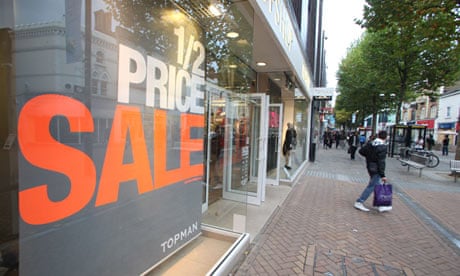UK inflation eased last month as retailers cut prices to tempt cash-strapped shoppers.
The news will pave the way for the Bank of England to inject more money into the economy in a bid to pull the country out of recession.
The Office for National Statistics (ONS) said annual consumer price inflation came down to 2.5% in August, from 2.6% in July. That brings it closer to the 2% target and should help consumers who have seen their spending power shrink as wages fail to match inflation.
The Bank of England expects inflation to ease below the 2% target by early next year, but that could be scuppered by rising oil and commodity prices. Most economists expect the central bank to increase its £375bn quantitative easing programme after the next £50bn round is completed in November.
The ONS said lower prices for clothes, furniture and household services helped offset an increase in the cost of fuel. Retail price inflation – which includes the cost of mortgages and council tax – also eased to 2.9% from 3.2% in July. In that larger basket of goods, a decline in the cost of food, clothes and household goods helped offset a rise in travel fares.
Samuel Tombs at Capital Economics said: "July's core inflation rate had been boosted by the earlier-than-usual end to high street sales and a sharp Olympics-related rise in air fares inflation, so a drop back in August had always looked likely."
He expects inflation to drop even further in September – perhaps to 2%. "Meanwhile, the weak economy should push core price pressures down further, keeping inflation low next year," Tombs added. "As a result, we doubt that the outlook for inflation will dissuade the MPC from announcing more asset purchases later this year."
Jeremy Cook, chief economist at foreign exchange company World First, said the UK economy still faced a "slow grind" this year.
"Although inflation is once again falling, the disparity between prices and wages will remain the key spread that needs closing through the second half of the year – so as to revive consumer demand." Cook said.

Comments (…)
Sign in or create your Guardian account to join the discussion